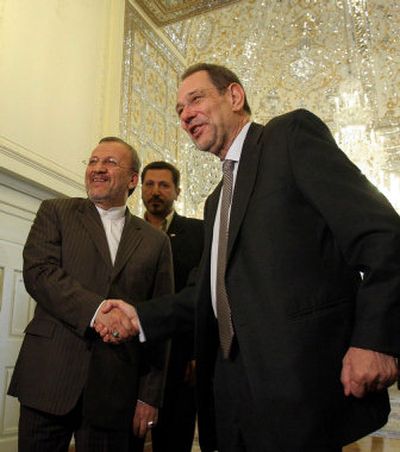Concessions offered to Iran

TEHRAN, Iran – The diplomatic package backed by Washington and formally presented to Iran on Tuesday leaves open the possibility that Tehran will be able to enrich uranium on its own soil, U.S. and European officials said.
That concession, along with a promise of U.S. assistance for an Iranian civilian nuclear energy program, is conditioned on Tehran suspending its current nuclear work until the U.N.’s International Atomic Energy Agency determines with confidence that the program is peaceful. U.S. officials said Iran would also need to satisfy the U.N. Security Council that it is not seeking a nuclear weapon, a benchmark which White House officials believe could take years, if not decades, to achieve.
But the Bush administration and its European allies have withdrawn their demand that Iran abandon any hope of enriching uranium for nuclear power, according to several European and U.S. officials with knowledge of the offer.
“We are basically now saying that over the long haul, if they restore confidence, that this Iranian regime can have enrichment at home,” said one U.S. official, who spoke on condition of anonymity. “But they have to answer every concern given all that points to a secret weapons program.”
Iran built its nuclear program in secret over 18 years. The effort was exposed by dissidents in 2002, setting off a U.N. investigation that has not found proof of a weapons program but has been unable to rule one out. Iran maintains that the program was designed for nuclear energy, not weapons.
The list of incentives that European Union foreign policy chief Javier Solana detailed to Iranian officials here on Tuesday was endorsed by the five permanent members of the U.N. Security Council plus Germany. It contains not only the revamped American promises on enrichment but a U.S. offer to join negotiations directly if Iran suspends its program, as well as European assistance in building additional light-water nuclear power plants and support for Iranian membership in the World Trade Organization.
“We had constructive talks,” Iran’s chief nuclear negotiator, Ali Larijani, told reporters after the two-hour meeting in the palatial offices of Iran’s Supreme National Security Council. “There are some positive steps in it and also some ambiguities.”
Larijani did not elaborate, but diplomats said the atmospherics surrounding the meeting appeared to reinforce recent assurances by Iranian officials that the new proposal would be considered seriously.
Speaking privately, a senior Iranian official said that the offer appeared to have much worthy of consideration.
Talking with reporters in Laredo, Texas, President Bush said Larijani’s reaction to the proposals “sounds like a positive response to me.”
“I want to solve this issue with Iran diplomatically. … We will see if the Iranians take our offer seriously. The choice is theirs to make,” Bush said.